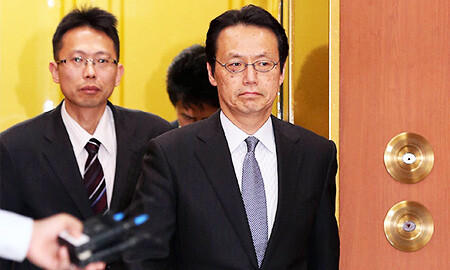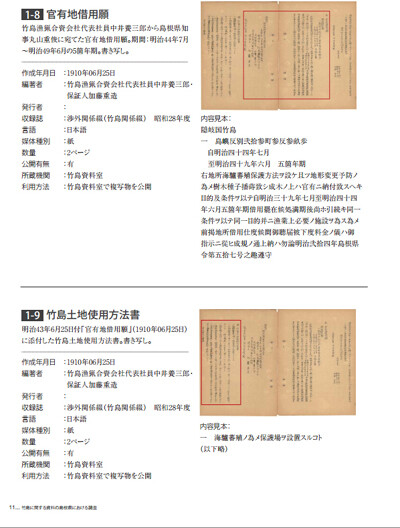hankyoreh
Links to other country sites 다른 나라 사이트 링크
Japan’s Diplomatic Bluebook deletes phrase about “shared values” with South Korea

On Apr. 7, the Japanese cabinet adopted a Diplomatic Bluebook for 2015 that deletes a phrase describing South Korea as sharing fundamental values such as “democracy and basic human rights” with Japan and includes a phrase about Dokdo being Japan’s “sovereign territory.” Along with the results of the middle school textbook assessment that Japan published the day before, this bodes ill for relations between Seoul and Tokyo.
In the Diplomatic Bluebook published on Tuesday, the Japanese government expressed its basic position about its relations with South Korea as follows: “South Korea is our most important partner in the region, and amicable relations with South Korea are indispensable for peace and stability in the Asia-Pacific region.”

However, after the phrase stating that South Korea and Japan are “neighbors that share fundamental values” was removed from the website of the Japanese Foreign Ministry in early March of this year, the same phrase was also omitted from the 2015 Diplomatic Bluebook.
In regard to Dokdo, the Japanese government retained the same language it has used in the Diplomatic Bluebook since 2000, describing it as being “clearly Japan’s sovereign territory, whether viewed historically or in terms of international law.”
The reason that Japan had used the expression “fundamental values” when describing its relations with South Korea is because of the Korea-Japan partnership that then South Korean President Kim Dae-jung and then Japanese Prime Minister Keizo Obuchi announced in Oct. 1998.
At that time, South Korea and Japan looked back at what they had achieved together in the half century since the end of World War II and agreed to keep working to improve their relations in the future.
Therefore, for the Abe government to delete the expression “fundamental values” from its description of its relations with South Korea could be seen as damaging the spirit of the partnership that has been the foundation for developing bilateral relations since the first decade of this century.
The promise that South Korea and Japan made 17 years ago to “build and develop the bilateral partnership as a joint goal in the 21st century” has vanished, and South Korea-Japan relations have returned to the 20th century, when they were marked by continuing hostility and conflict.
In place of the phrase symbolizing friendly relations between the two countries was a longwinded excuse about the comfort women. In the past, the Japanese government had referred to the comfort women as a major issue affecting relations with South Korea, but in this document, it placed the issue after an outline of diplomacy in the Asia-Pacific region as a whole.
“It is the position of the Japanese government that all claims about property and compensation for the war, including the issue of the comfort women, were sincerely addressed and brought to a complete legal resolution through a number of treaties, including the Treaty of San Francisco [1951],” the document says. “South Korea continues to ask Japan for a response, but the Japanese government will do its best to help South Korea understand its position.”
On Tuesday, the South Korean Ministry of Foreign Affairs issued a statement through a spokesperson condemning Japan’s Diplomatic Bluebook and summoned Kenji Kanasugi the Minster and Deputy Chief of Mission from the Japanese embassy to lodge a demarche. This response comes after South Korea’s Vice Foreign Minister Cho Tae-yong summoned Koro Bessho, Japan’s ambassador to South Korea, to the Ministry of Foreign Affairs in Seoul to lodge a demarche about the Japanese government‘s assessment of middle school textbooks that make territorial claims to Dokdo (called Takeshima in Japan).
“No matter what kind of chopped logic the Japanese government may employ, Dokdo, which is Korea’s sovereign territory, was the victim to the Japanese Empire’s annexation of the Korean peninsula. Furthermore, it is a historical fact that can be neither erased nor revised that the comfort women for the Japanese imperial army were forcibly mobilized and subjected to unspeakable suffering and injuries,” Foreign Ministry Spokesperson Roh Gwang-il said in the statement.
However, the South Korean government did not make an official response to the deletion of the phrase about South Korea and Japan being “neighbors who share fundamental values and interests.”
By Gil Yun-hyung, Tokyo correspondent, Kim Oi-hyun, staff reporter
Please direct questions or comments to [english@hani.co.kr]

Editorial・opinion
![[Column] Season 2 of special prosecutor probe may be coming to Korea soon [Column] Season 2 of special prosecutor probe may be coming to Korea soon](https://flexible.img.hani.co.kr/flexible/normal/500/300/imgdb/original/2024/0426/3317141030699447.jpg) [Column] Season 2 of special prosecutor probe may be coming to Korea soon
[Column] Season 2 of special prosecutor probe may be coming to Korea soon![[Column] Park Geun-hye déjà vu in Yoon Suk-yeol [Column] Park Geun-hye déjà vu in Yoon Suk-yeol](https://flexible.img.hani.co.kr/flexible/normal/500/300/imgdb/original/2024/0424/651713945113788.jpg) [Column] Park Geun-hye déjà vu in Yoon Suk-yeol
[Column] Park Geun-hye déjà vu in Yoon Suk-yeol- [Editorial] New weight of N. Korea’s nuclear threats makes dialogue all the more urgent
- [Guest essay] The real reason Korea’s new right wants to dub Rhee a founding father
- [Column] ‘Choson’: Is it time we start referring to N. Korea in its own terms?
- [Editorial] Japan’s rewriting of history with Korea has gone too far
- [Column] The president’s questionable capacity for dialogue
- [Column] Are chaebol firms just pizza pies for families to divvy up as they please?
- [Column] Has Korea, too, crossed the Rubicon on China?
- [Correspondent’s column] In Japan’s alliance with US, echoes of its past alliances with UK
Most viewed articles
- 1[Column] Season 2 of special prosecutor probe may be coming to Korea soon
- 2No good, very bad game for Korea puts it out of Olympics for first time since 1988
- 3‘We must say no’: Seoul defense chief on Korean, USFK involvement in hypothetical Taiwan crisis
- 4Korea’s 1.3% growth in Q1 signals ‘textbook’ return to growth, says government
- 5Division commander ordered troops to enter raging flood waters before Marine died, survivor says
- 6Is N. Korea threatening to test nukes in response to possible new US-led sanctions body?
- 7Is Japan about to snatch control of Line messenger from Korea’s Naver?
- 8[Editorial] In the year since the Sewol, our national community has drowned
- 9[Editorial] 10 years on, lessons of Sewol tragedy must never be forgotten
- 10[Editorial] New weight of N. Korea’s nuclear threats makes dialogue all the more urgent